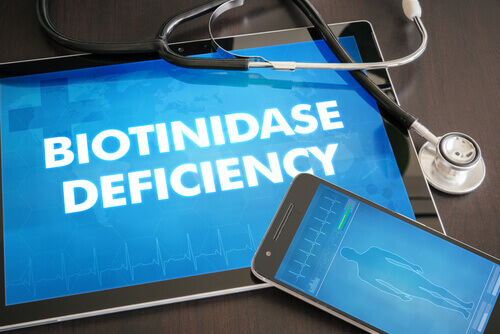
Biotinidase Deficiency
- Posted Category : Articles
- 10 June 2018
Biotinidase Deficiency
Biotinidase deficiency (BIOT) is an inherited condition in which the body is unable to reuse and recycle the vitamin biotin. Because the body needs free biotin to break down fats, proteins, and carbohydrates effectively, individuals with BIOT are less able to process important nutrients. There are two types biotinidase deficiency (BIOT) that differ in severity and treatment. Both forms of the condition can cause serious health concerns. Children with BIOT who are identified through newborn screening and begin treatment immediately usually remain healthy with normal development.
CONDITION TYPE
Other Disorders
FREQUENCY
How common is biotinidase deficiency?
Biotinidase deficiency occurs in one out of every 60,000 births. The condition is most common among individuals of European descent. However, it is reported among individuals of Turkish, Saudi Arabian, and Japanese descent, as well.
ALSO KNOWN AS
BIOT
BTD deficiency
Late-onset biotin-responsive multiple carboxylase deficiency
Late-onset multiple carboxylase deficiency
Type of Biotinidase
There are two main types of biotinidase deficiency (BIOT), differing in the severity of signs: severe “profound biotinidase deficiency” and mild “partial biotinidase deficiency.”
Signs of BIOT usually start within a few months after birth. In some cases, the symptoms may not appear until childhood. This is why early screening and identification is so important.
Early signs of BIOT include:
Seizures
Weak muscle tone (known as hypotonia)
Trouble breathing
Skin rash
Hair loss
Trouble balancing
A fungal infection called candidiasis
Many of these signs can be triggered by illnesses or infections.
Treatment
Supplements
Children with biotinidase deficiency (BIOT) often require lifelong treatment with biotin supplements. This is a natural vitamin found in food, but children with BIOT might not have enough of it in their bodies. Biotin supplements can help your baby’s body break down the fats, proteins, and carbohydrates found in food. Your baby’s doctor can help determine the right dosage of biotin for your child and write an appropriate prescription. to measure the levels of certain substances in the child’s blood.
Expected outcomes
If biotinidase deficiency (BIOT) is treated, your child will likely have healthy growth and development.
It is important to screen for and treat BIOT early because once your child experiences certain medical complications such as developmental delay, eye abnormalities, or hearing loss, treatment cannot reverse any damage that has occurred.
PMA_SA
All opinions and comments displayed do not necessarily represent the official opinion of the website, but they represent the view of the writer
